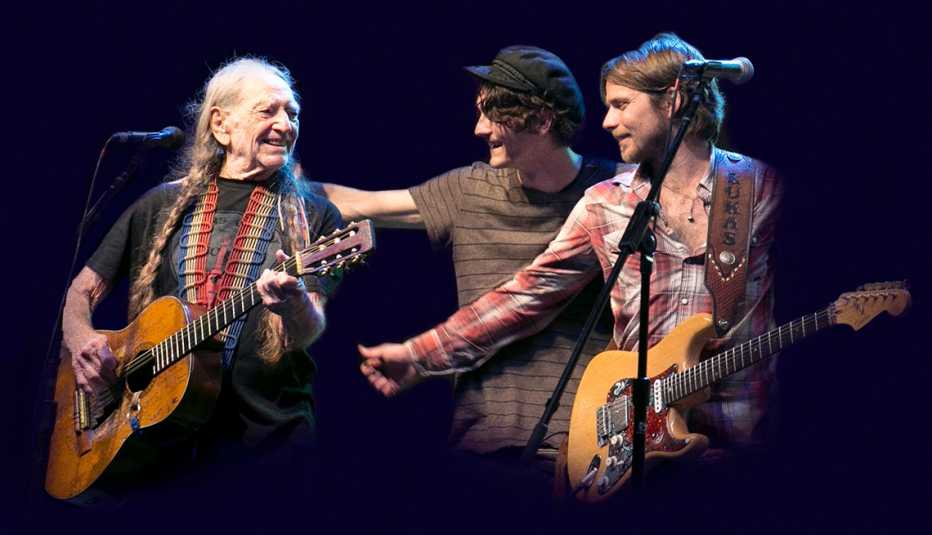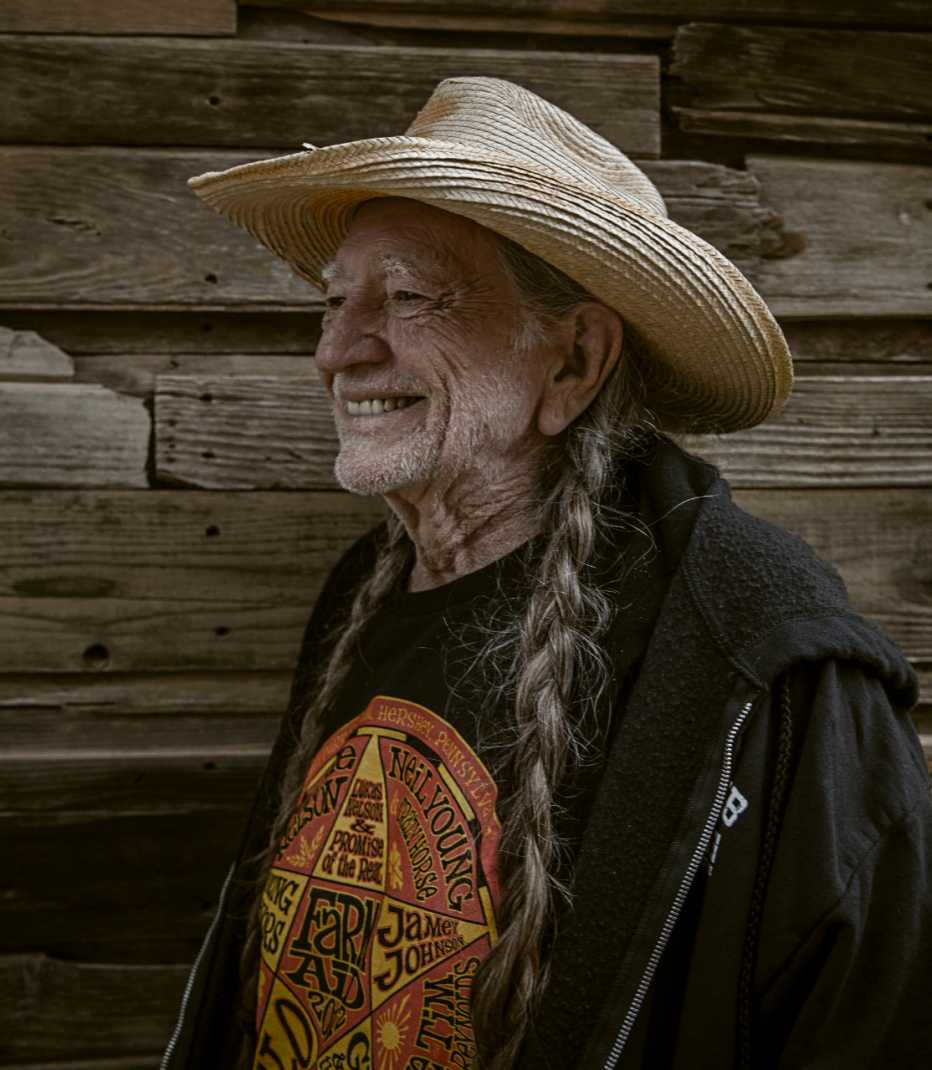AARP Hearing Center
Willie Nelson turned 85 in April, and though he still tours, drinks, vapes, writes and golfs, he’s smart enough to know where he is — on the flip side, the back nine. It gives him freedom; he’s down to essential things now, with time for only what he truly loves. Like his wife and children. Like his famous guitar, Trigger, the one with the hole worn through the top from strumming. Like Frank Sinatra and country music.
Willie’s taught us so much — how to be an honest outlaw, how to properly wear a bandanna, how to listen and how to be cool. Now just one lesson remains: how to remain yourself while getting old. “I don’t think that my attitude has changed,” he told me. “I’m still doing what I want to do, and I suggest everybody do the same thing.”
I could try to sell you on the importance of Willie Nelson, but why? He notched his first hit as a songwriter in 1960 with a tune called “Family Bible.” In the decades that have followed, he’s performed on 24 platinum or gold albums and composed dozens of pop and country hits, including iconic, timeless numbers such as “On the Road Again” and “Me and Paul,” about wild times on tour with his drummer, Paul English. He’s appeared in more than 40 movies and headlined thousands of sold-out concerts. He smoked a joint on the White House roof during the Carter administration in 1977; organized Farm Aid, the annual benefit for American family farmers, in 1985; and made more than a few men reconsider the practicability of braids. He has his own satellite radio station, Willie’s Roadhouse, which is partly programmed by his daughter Paula. He has his own brand of weed, Willie’s Reserve, a bespoke variety that’s been well funded by venture capitalists. Some of the labels in that line carry Willie’s sleepy-eyed countenance, making him a kind of Captain Morgan for the bloodshot set. He was at the center of a group of run-around country music pals — with Waylon Jennings, Johnny Cash and Kris Kristofferson — who played together as the Highwaymen. As one of two survivors of that crew, Willie stands as a last living link between Hank Williams, the Babe Ruth of honky-tonk, and Blake Shelton, a country star of the moment.
Of course, there have been hard times, for this is country music: drug busts and failed marriages. The first marriage, which lasted 10 years, gave Willie a lot of the heartbreak material that still turns up in his sad songs. And in 1990, after Willie followed some disastrous financial advice, the IRS seized about everything he had — saying he owed $32 million in back taxes — with the exception of his guitar and his voice, which he used to climb back out of the hole.


These days, he seems more joyful than ever, as satisfied as any country singer who’s lived past 30. His album count is well over 100, and his latest, Last Man Standing, features all new, original songs. He’s at work on a collection of Sinatra tunes, including “My Way.” But Willie does not like to talk about his achievements or place in history or how it will all be tallied when he’s gone. Sing about it, write about it, sure — his current live show includes “Still Not Dead” and “Roll Me Up and Smoke Me When I Die” — but discussing his legacy with a reporter is the worst kind of bad luck. He wants to talk about his life instead. He grew up in Abbott, Texas, a blink-and-you’ll-miss-it spot 70 miles outside Dallas. “They say the population never changes,” he told me. “Every time a baby’s born, a man leaves town.” His parents divorced when he was an infant, leaving Willie and his older sister, Bobbie, who gives his band its piano distinction — her instrument sounds as rickety as a piano in a saloon in Deadwood, S.D., circa 1885 — to be raised by their devoted grandparents. Comfort came via radio, old-time music wending through a Texas night. It suggested another kind of existence.
At some point, Willie picked up a guitar. “I started when I was 5 or 6,” he told me. “I had one of those old Sears & Roebuck guitars with the strings high off the neck — your fingers literally would bleed. When they healed up, though, they were pretty tough.” He was soon singing and playing at churches and in town halls, his sister hammering away at his side. Other things happened: He joined the Air Force, worked as a door-to-door vacuum and encyclopedia salesman, and as a disc jockey. And wrote. Those first songs came under the influence of country legends. “Bob Wills era,” he said. “Spade Cooley. Tex Williams. All those great Western swing bands.”
Flat broke, Willie headed to Nashville, Tenn., the mecca of country music. That was 1960. He worked his way into the late-night lineup at Tootsie’s Orchid Lounge, which was across the alley from the Grand Ole Opry. Singers and songwriters partied at Tootsie’s from can till can’t. It’s where Willie debuted the songs — many now considered classics — that would become career-defining hits for other artists: “Hello Walls,” “Night Life,” “Funny How Time Slips Away.” One night he played a demo for Charlie Dick, a manager who happened to be married to Patsy Cline. Dick took Willie home, woke Cline and made Willie play her the demo tape. It was called “Crazy,” and it went Top 10 for Cline in 1961. Released before she died, it’s forever associated with the sadly beautiful mood of that short life.
Willie had a record contract of his own, but his voice was different from what you usually heard on the country charts. It had that old Western thing, the twang, but it was sophisticated, too, all about emphasizing certain words and drawing out certain syllables. It was only when he moved back to Texas that he found his audience and became not just a star, but the biggest star in country music. The rest followed as in a dream — surprising yet inevitable. Records and movies, sold-out stadiums, tours. He let his hair grow, braids thrown back, took up marijuana as a way to settle his mood. Before dope, he’s said, he was angry a lot of the time. His face became famous in the way of a few other faces: John Wayne, Dolly Parton, Louis Armstrong. It represented not just a catalog of songs but a way of being in the world.
By the mid-1970s, he’d become that rarest of stars — an icon admired by even bigger icons. Bob Dylan recalls meeting Willie and his sidekick, English, at film director Sam Peckinpah’s house in Mexico in 1972. Willie and English “had driven down there in an old blue Mercedes 300 from Texas,” Dylan said. “We were sitting around in the living room, and Willie played some of his songs: ‘Night Life,’ ‘Hello Walls,’ ‘Crazy’ — all the great ones. I thought these were the most perfect songs that ever had a right to be written. I thought he was a genius then, and I think the same thing now.”
I’ve listened to Willie Nelson all my life but fell in love with him in 1992. It happened in a bar in New York City called the Lion’s Head. One night, I happened to play his version of “Blue Eyes Crying in the Rain” on the jukebox. It’s a Fred Rose song, unspeakably sad, the story of a man mourning his wife and looking forward to meeting her in the next world. It carries echoes of the oldest American music. It’s an intimate hillbilly whine. Willie recorded it in 1975 for Red Headed Stranger, one of his first million-selling albums. It was among the breakthrough songs that took Willie from Nashville 1960 into the 1970s and beyond. He found his mature style on that song, realized that he could sing anything and make it new. I’d get drunk on the sort of drinks I figured Willie would order — tequila, beer — line up my quarters and play the song till the men at the rail begged me to stop. When you are 22 and lonely and far from home, you feel sorry for yourself in a way that is the essence of country music. His voice was humorous and sad and full of wisdom; I knew he’d understand everything. If I ever did get to meet Willie Nelson, I promised myself I’d ask him the secret of life.


I caught up with Willie on his tour bus 26 years later; it was in March, just before he went onstage at the Peace Center in Greenville, S.C. He was sitting at a small table in back . Looking over his shoulder was Annie, his fourth wife. A makeup artist who met her husband in 1986 on the set of his made-for-TV movie Stagecoach, Ann Marie D’Angelo has been by Willie’s side through his health scares, pot busts, tax problems — “through thick and thin,” he’s said. “You can’t ask for anything more than that!” She travels with him and looks after his health — got him into bicycling, organic foods and living as if he intends to last. “Annie and I have been married since 1991 and found a way to make it work,” Willie has said. They have two adult children, Lukas and Micah, good musicians who often perform with Willie and their Aunt Bobbie. Willie was married three times before and had five other kids. In 1991, his oldest son, Billy, died at age 33. It’s something Willie never talks about, but it can be heard between every note of his most wrenching songs.




































































More From AARP
Tracy Morgan Is Back
After recovering from a brain injury, the comedian is returning with a new TV show and a full heart